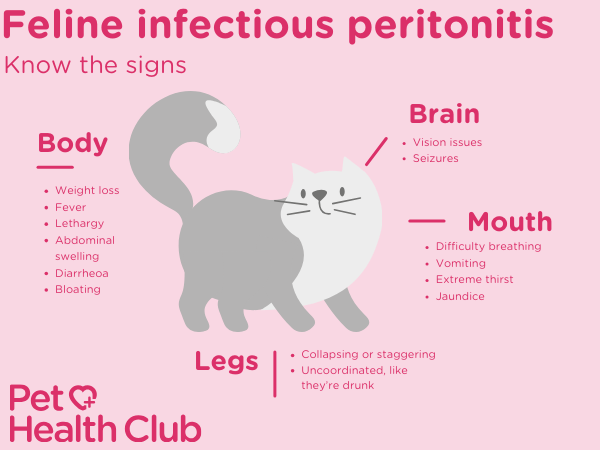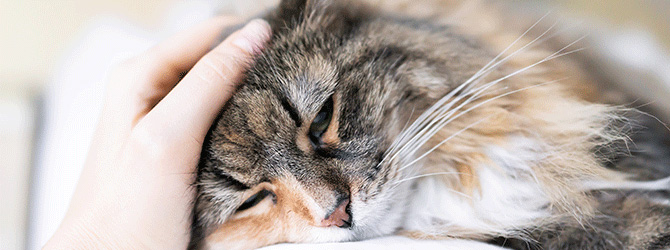FIP in cats and its link to coronavirus in cats
Feline infectious peritonitis (FIP) is an uncommon but often fatal disease caused by a mutated form of a common feline coronavirus. It happens when a specific type of feline coronavirus called FCoV mutates and interacts with the cat’s immune system to cause serious disease in the form of FIP. The disease, first identified in 1963, has become a major concern in recent years. FIP is challenging to diagnose due to its varied symptoms and the lack of specific tests, and can also be difficult to treat.
Brief summary
- FIP is a rare but serious coronavirus-related disease in cats
- Symptoms are variable, from fever and lethargy to abdominal swelling and neurological problems
- It’s more common in multi-cat households and challenging to diagnose
- Recent advances have made treatment possible, although not straightforward
- Prevention focuses on cleanliness, stress reduction, and hygiene, especially in multi-cat homes
Why has an outbreak of FIP in cats in Cyprus hit the news?
A deadly outbreak of feline coronavirus in Cyprus has killed an estimated 300,000 cats from feline infectious peritonitis. The Cyprus outbreak has resulted in an unprecedented spike in FIP among domestic and stray cats on the island due to the highly virulent viral mutation.
The identified Cyprus strain, F-CoV-23, is considered especially problematic for two reasons. Firstly, it is a highly contagious strain, and so is spreading rapidly through the population. Secondly, feline coronavirus usually needs to mutate to cause FIP, but this strain may be able to cause infectious peritonitis without mutation, leading to much higher case numbers of FIP than usual.
The first known F-CoV-23 case in the UK occurred in a cat from Cyprus. Concerns remain about further UK spread, given how many people holiday on the island. Scientists from the Royal Veterinary College, the University of Edinburgh, and the Cypriot government confirmed that the British case shares the same genetic fingerprint as 91 of the cases in Cyprus. They warn the situation is serious given this strain's high virulence and contagiousness.
Experts are urging caution for those exposed to cats in Cyprus, particularly those living in crowded facilities. Hygiene is essential for anyone who has been in contact with cats in Cyprus. The British Veterinary Association recommends taking precautions, such as cleaning suitcase wheels and shoes before re-entry into the UK, to avoid bringing the virus into the country.
While the risk of the disease spreading in the UK is still low, cat owners should keep a close eye on potential symptoms and seek urgent veterinary advice if they’re worried about FIP.
Read more: Why is my cat being sick?
What are FIP in cats symptoms?
There are two types of FIP — wet and dry. Cats with either type may show symptoms such as fever, weight loss, lethargy, and abdominal swelling. Neurological symptoms like incoordination and seizures can also occur, alongside gastrointestinal issues such as diarrhoea and vomiting.
Wet FIP also causes fluid retention in the stomach, chest, or both. Fluid in the chest often leads to difficulty breathing, while fluid in the stomach can cause the abdomen to bloat.
Dry FIP can cause inflammatory lesions to form in the cat’s vital organs. If these affect the kidneys, they can cause vomiting, as well as excessive thirst and urination. If they affect the liver, this can go on to cause jaundice. Dry FIP can also affect your cat’s eyes and nervous system.

Read more: What are the symptoms, causes and vaccine for cat flu?
When should I see a vet about feline infectious peritonitis?
Detecting FIP early is vital. Cats with persistent health issues like chronic weight loss or fever should be monitored for FIP. The diagnosis involves a comprehensive approach, combining the cat's health history, observed symptoms, and various diagnostic tests.
Quickfire Q&A about FIP
| Question | Answer |
|---|---|
| Can a cat with FIP survive? | Although FIP is nearly always fatal if left untreated, recent advances in antiviral drugs such as remdesivir and GS-441524 have significantly improved survival rates. These treatments can be effective, but they require lengthy and costly treatment. |
| What are the final stages of FIP in cats? | In the late stages, cats may experience a range of symptoms like difficulty breathing due to fluid accumulation in the chest, neurological issues, eye problems, and jaundice due to liver issues. |
| What is the FIP in cats life expectancy? | Without treatment, the prognosis for FIP is generally poor, with cats often succumbing within weeks to months. However, with the advent of new antiviral treatments, many cats are now able to survive, although these require long and expensive medication courses. |
| Is FIP in cats contagious? | While FIP itself is not contagious, the feline coronavirus that can mutate into FIP is highly infectious among cats. The virus causing FIP, however, doesn't typically spread directly from one cat to another. |
| How do cats get FIP? | FIP occurs when a benign feline coronavirus mutates within a cat’s body. Cats usually contract the virus through contact with infected feces, often in multi-cat environments. Direct transmission from mother to kittens is also possible, but not all FCoV infections lead to FIP. |
| What are the treatment options for FIP? | Recent treatments for FIP include the oral medication GS-441524 and its injectable form, remdesivir. Treatment typically lasts for 12 weeks and can be costly. While not all cats respond to treatment, more than 85% show improvement. See more below. |
| Can cat owners prevent FIP? | To prevent FIP, owners should focus on minimising the spread of feline coronavirus. This involves practicing good hygiene, isolating sick cats, avoiding overcrowding in multi-cat environments, and managing stress to reduce susceptibility to the virus. |
| Can humans catch feline coronavirus or FIP? | No, humans can't catch feline coronavirus or FIP. These viruses are specific to cats and do not cross-infect humans. |
Can FIP in cats be treated?
Up until recently, there were no treatment options for FIP, and management focused on symptomatic treatment and relieving discomfort. However, there are now two licensed treatments for FIP in the UK. GS-441524 is a tablet medication, and its parent drug remdesivir is an injectable form. Treatment is generally performed for 12 weeks, but repeat treatment courses may be required. This is, therefore quite a commitment, and the medications can be very expensive. Cats will need close monitoring during treatment, including regular examinations and blood tests. A successful outcome is not guaranteed of course, and there is still a lot of research ongoing, but current estimates show that over 85% of cats respond to treatment following at least 12 weeks of treatment, with long-term remission.
Read more: How to introduce a new cat to your home
Any studies into FIP?
One study into FIP by Katrin Hartmann extensively investigated FIP. It showed that while many cats catch the FCoV virus, only a few get FIP. The study found that a cat's genes and living conditions can affect their chances of getting FIP, with young and weaker cats at higher risk. Making an effective vaccine for FIP is difficult, and current treatments don't work well. The study also stressed the importance of finding better ways to spot FIP early and manage cat groups to stop the spread of FCoV and lower the chances of cats getting FIP.
Another study examined the new oral drug for curing FIP in cats. The researchers tested its effectiveness and side effects in 18 cats with natural FIP and found the drug had strong virus-killing power in lab tests and significantly improved the cats' health in a few days without severe side effects. All the cats fully recovered after 84 days of treatment.
Numerous studies into FIP are currently being carried out, including at the University of Edinburgh's Royal (Dick) School of Veterinary Studies and UC Davis. Their aim is to improve the diagnosis, treatment, and prognosis of FIP.
Read more: Importance of routine health checks for cats
Want advice on FIP?
For expert advice on feline infectious peritonitis get in touch with your local vet.
Find your nearest vet using our find a vet page, or speak to a vet online using our video vets service.


